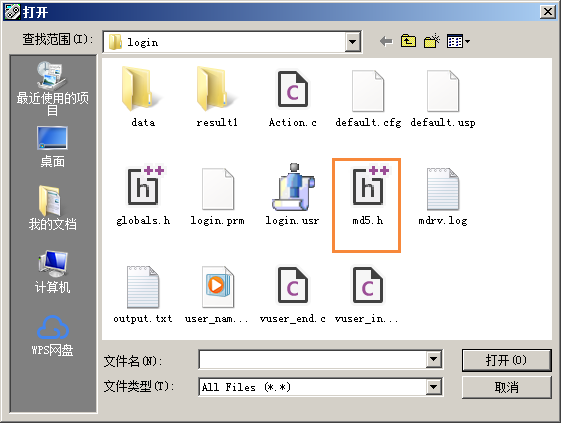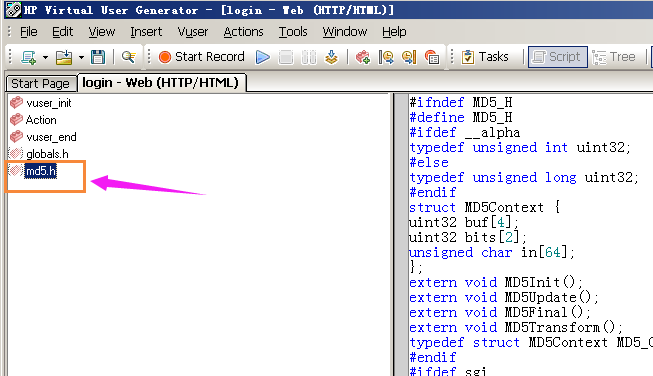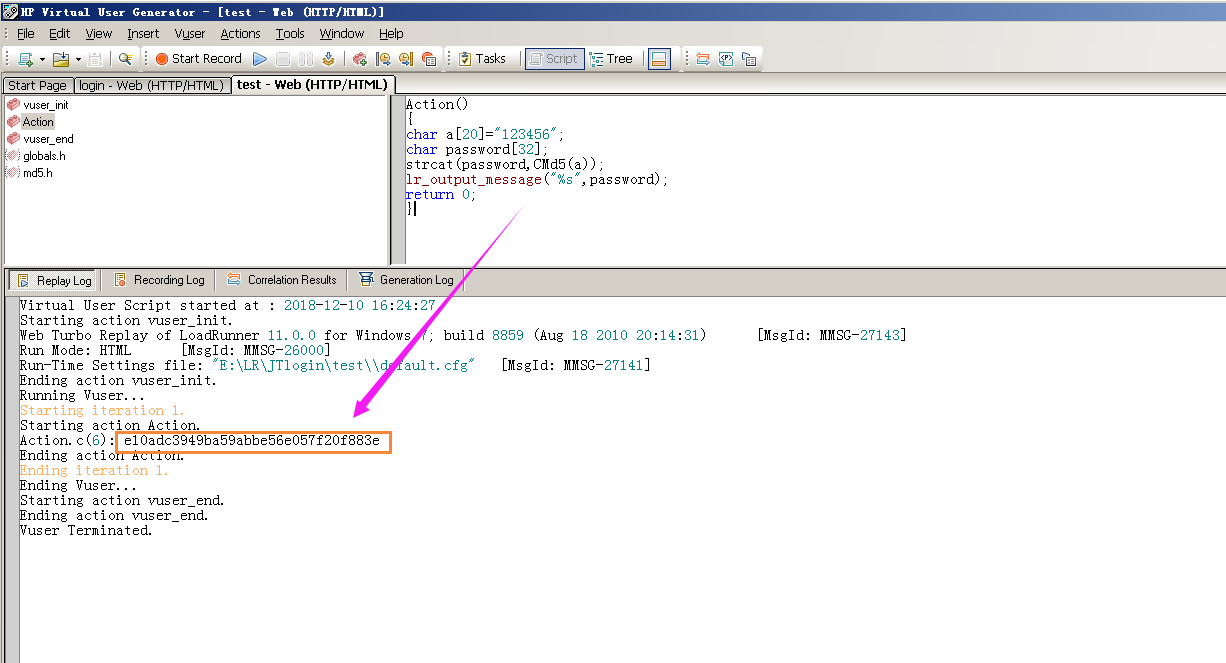在录制用户注册登录脚本时,常常会遇到web程序对用户密码进行加密处理。在很多时候采用的加密方式为MD5.
这时有两种处理方式:
一、所有用户采用同一密码
例如:每个用户名的密码都为e10adc3949ba59abbe56e057f20f883e
该密码即123456
二、用户采用不同的密码,调用md5加密算法进行加密。
1、首先新建一个MD5加密算法的文件:md5.h
新建一个md5.h文件,文件里面具体的算法网上都有下载,具体如下(直接将下面的算法拷贝到md5.h文件中):
#ifndef MD5_H #define MD5_H #ifdef __alpha typedef unsigned int uint32; #else typedef unsigned long uint32; #endif struct MD5Context { uint32 buf[4]; uint32 bits[2]; unsigned char in[64]; }; extern void MD5Init(); extern void MD5Update(); extern void MD5Final(); extern void MD5Transform(); typedef struct MD5Context MD5_CTX; #endif #ifdef sgi #define HIGHFIRST #endif #ifdef sun #define HIGHFIRST #endif #ifndef HIGHFIRST #define byteReverse(buf, len) /* Nothing */ #else void byteReverse(buf, longs)unsigned char *buf; unsigned longs; { uint32 t; do { t = (uint32) ((unsigned) buf[3] << 8 | buf[2]) << 16 |((unsigned) buf[1] << 8 | buf[0]); *(uint32 *) buf = t; buf += 4; } while (--longs); } #endif void MD5Init(ctx)struct MD5Context *ctx; { ctx->buf[0] = 0x67452301; ctx->buf[1] = 0xefcdab89; ctx->buf[2] = 0x98badcfe; ctx->buf[3] = 0x10325476; ctx->bits[0] = 0; ctx->bits[1] = 0; } void MD5Update(ctx, buf, len) struct MD5Context *ctx; unsigned char *buf; unsigned len; { uint32 t; t = ctx->bits[0]; if ((ctx->bits[0] = t + ((uint32) len << 3)) < t) ctx->bits[1]++; ctx->bits[1] += len >> 29; t = (t >> 3) & 0x3f; if (t) { unsigned char *p = (unsigned char *) ctx->in + t; t = 64 - t; if (len < t) { memcpy(p, buf, len); return; } memcpy(p, buf, t); byteReverse(ctx->in, 16); MD5Transform(ctx->buf, (uint32 *) ctx->in); buf += t; len -= t; } while (len >= 64) { memcpy(ctx->in, buf, 64); byteReverse(ctx->in, 16); MD5Transform(ctx->buf, (uint32 *) ctx->in); buf += 64; len -= 64; } memcpy(ctx->in, buf, len); } void MD5Final(digest, ctx) unsigned char digest[16]; struct MD5Context *ctx; { unsigned count; unsigned char *p; count = (ctx->bits[0] >> 3) & 0x3F; p = ctx->in + count; *p++ = 0x80; count = 64 - 1 - count; if (count < 8) { memset(p, 0, count); byteReverse(ctx->in, 16); MD5Transform(ctx->buf, (uint32 *) ctx->in); memset(ctx->in, 0, 56); } else { memset(p, 0, count - 8); } byteReverse(ctx->in, 14); ((uint32 *) ctx->in)[14] = ctx->bits[0]; ((uint32 *) ctx->in)[15] = ctx->bits[1]; MD5Transform(ctx->buf, (uint32 *) ctx->in); byteReverse((unsigned char *) ctx->buf, 4); memcpy(digest, ctx->buf, 16); memset(ctx, 0, sizeof(ctx)); } #define F1(x, y, z) (z ^ (x & (y ^ z))) #define F2(x, y, z) F1(z, x, y) #define F3(x, y, z) (x ^ y ^ z) #define F4(x, y, z) (y ^ (x | ~z)) #define MD5STEP(f, w, x, y, z, data, s) ( w += f(x, y, z) + data, w = w<<s | w>>(32-s), w += x ) void MD5Transform(buf, in) uint32 buf[4]; uint32 in[16]; { register uint32 a, b, c, d; a = buf[0]; b = buf[1]; c = buf[2]; d = buf[3]; MD5STEP(F1, a, b, c, d, in[0] + 0xd76aa478, 7); MD5STEP(F1, d, a, b, c, in[1] + 0xe8c7b756, 12); MD5STEP(F1, c, d, a, b, in[2] + 0x242070db, 17); MD5STEP(F1, b, c, d, a, in[3] + 0xc1bdceee, 22); MD5STEP(F1, a, b, c, d, in[4] + 0xf57c0faf, 7); MD5STEP(F1, d, a, b, c, in[5] + 0x4787c62a, 12); MD5STEP(F1, c, d, a, b, in[6] + 0xa8304613, 17); MD5STEP(F1, b, c, d, a, in[7] + 0xfd469501, 22); MD5STEP(F1, a, b, c, d, in[8] + 0x698098d8, 7); MD5STEP(F1, d, a, b, c, in[9] + 0x8b44f7af, 12); MD5STEP(F1, c, d, a, b, in[10] + 0xffff5bb1, 17); MD5STEP(F1, b, c, d, a, in[11] + 0x895cd7be, 22); MD5STEP(F1, a, b, c, d, in[12] + 0x6b901122, 7); MD5STEP(F1, d, a, b, c, in[13] + 0xfd987193, 12); MD5STEP(F1, c, d, a, b, in[14] + 0xa679438e, 17); MD5STEP(F1, b, c, d, a, in[15] + 0x49b40821, 22); MD5STEP(F2, a, b, c, d, in[1] + 0xf61e2562, 5); MD5STEP(F2, d, a, b, c, in[6] + 0xc040b340, 9); MD5STEP(F2, c, d, a, b, in[11] + 0x265e5a51, 14); MD5STEP(F2, b, c, d, a, in[0] + 0xe9b6c7aa, 20); MD5STEP(F2, a, b, c, d, in[5] + 0xd62f105d, 5); MD5STEP(F2, d, a, b, c, in[10] + 0x02441453, 9); MD5STEP(F2, c, d, a, b, in[15] + 0xd8a1e681, 14); MD5STEP(F2, b, c, d, a, in[4] + 0xe7d3fbc8, 20); MD5STEP(F2, a, b, c, d, in[9] + 0x21e1cde6, 5); MD5STEP(F2, d, a, b, c, in[14] + 0xc33707d6, 9); MD5STEP(F2, c, d, a, b, in[3] + 0xf4d50d87, 14); MD5STEP(F2, b, c, d, a, in[8] + 0x455a14ed, 20); MD5STEP(F2, a, b, c, d, in[13] + 0xa9e3e905, 5); MD5STEP(F2, d, a, b, c, in[2] + 0xfcefa3f8, 9); MD5STEP(F2, c, d, a, b, in[7] + 0x676f02d9, 14); MD5STEP(F2, b, c, d, a, in[12] + 0x8d2a4c8a, 20); MD5STEP(F3, a, b, c, d, in[5] + 0xfffa3942, 4); MD5STEP(F3, d, a, b, c, in[8] + 0x8771f681, 11); MD5STEP(F3, c, d, a, b, in[11] + 0x6d9d6122, 16); MD5STEP(F3, b, c, d, a, in[14] + 0xfde5380c, 23); MD5STEP(F3, a, b, c, d, in[1] + 0xa4beea44, 4); MD5STEP(F3, d, a, b, c, in[4] + 0x4bdecfa9, 11); MD5STEP(F3, c, d, a, b, in[7] + 0xf6bb4b60, 16); MD5STEP(F3, b, c, d, a, in[10] + 0xbebfbc70, 23); MD5STEP(F3, a, b, c, d, in[13] + 0x289b7ec6, 4); MD5STEP(F3, d, a, b, c, in[0] + 0xeaa127fa, 11); MD5STEP(F3, c, d, a, b, in[3] + 0xd4ef3085, 16); MD5STEP(F3, b, c, d, a, in[6] + 0x04881d05, 23); MD5STEP(F3, a, b, c, d, in[9] + 0xd9d4d039, 4); MD5STEP(F3, d, a, b, c, in[12] + 0xe6db99e5, 11); MD5STEP(F3, c, d, a, b, in[15] + 0x1fa27cf8, 16); MD5STEP(F3, b, c, d, a, in[2] + 0xc4ac5665, 23); MD5STEP(F4, a, b, c, d, in[0] + 0xf4292244, 6); MD5STEP(F4, d, a, b, c, in[7] + 0x432aff97, 10); MD5STEP(F4, c, d, a, b, in[14] + 0xab9423a7, 15); MD5STEP(F4, b, c, d, a, in[5] + 0xfc93a039, 21); MD5STEP(F4, a, b, c, d, in[12] + 0x655b59c3, 6); MD5STEP(F4, d, a, b, c, in[3] + 0x8f0ccc92, 10); MD5STEP(F4, c, d, a, b, in[10] + 0xffeff47d, 15); MD5STEP(F4, b, c, d, a, in[1] + 0x85845dd1, 21); MD5STEP(F4, a, b, c, d, in[8] + 0x6fa87e4f, 6); MD5STEP(F4, d, a, b, c, in[15] + 0xfe2ce6e0, 10); MD5STEP(F4, c, d, a, b, in[6] + 0xa3014314, 15); MD5STEP(F4, b, c, d, a, in[13] + 0x4e0811a1, 21); MD5STEP(F4, a, b, c, d, in[4] + 0xf7537e82, 6); MD5STEP(F4, d, a, b, c, in[11] + 0xbd3af235, 10); MD5STEP(F4, c, d, a, b, in[2] + 0x2ad7d2bb, 15); MD5STEP(F4, b, c, d, a, in[9] + 0xeb86d391, 21); buf[0] += a; buf[1] += b; buf[2] += c; buf[3] += d; } char* CMd5(const char* s) { struct MD5Context md5c; unsigned char ss[16]; char subStr[3],resStr[33]; int i; MD5Init( &md5c ); MD5Update( &md5c, s, strlen(s) ); MD5Final( ss, &md5c ); strcpy(resStr,""); for( i=0; i<16; i++ ) { sprintf(subStr, "%02x", ss[i] ); itoa(ss[i],subStr,16); if (strlen(subStr)==1) { strcat(resStr,"0"); } strcat(resStr,subStr); } strcat(resStr,"�"); return resStr; }
2、把新建的md5.h文件,放到脚本中。放置路径为脚本存放路径。例如我的脚本login被存放在E:LRJTlogin下面。所以我的放置路径为:E:LRJTloginlogin (注意:一定要放置在脚本下面)

3、接下来需要在LR中导入md5.h文件。
导入方法:右键单击globals.h,选择Add Files to Script添加md5.h文件。


添加完成后,LR中就有该文件了。如下:

4、然后在头文件globals.h中添加引用#include "md5.h"

5、上述步骤完成后,我们现在可调用CMd5()方法进行加密。

就这样我们就加密完成了,最后要做的就是将加密的password值传给需要用到的地方就可以了。